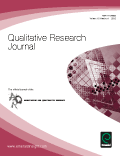
Qualitative Research Journal
Scope & Guideline
Connecting Minds Through Qualitative Dialogue
Introduction
Aims and Scopes
- Qualitative Methodologies:
The journal emphasizes a variety of qualitative research methodologies, including phenomenology, ethnography, autoethnography, and narrative inquiry. This focus allows for deep exploration of subjective experiences and social contexts. - Social Justice and Equity:
A core aim of the journal is to address issues of social justice, equity, and representation. Many studies reflect a commitment to understanding the lived experiences of marginalized communities and advocating for their voices. - Interdisciplinary Approaches:
The journal encourages interdisciplinary research, integrating insights from education, sociology, psychology, and cultural studies. This approach enriches the qualitative inquiry by bringing diverse theoretical frameworks and methodologies. - Reflexivity and Positionality:
Reflexivity is a significant theme in the journal, with many papers discussing the researcher's positionality and its impact on data collection and interpretation. This focus enhances the rigor and ethical considerations of qualitative research. - Innovative Data Collection Techniques:
The journal showcases innovative data collection methods, such as visual methodologies, poetic inquiry, and digital storytelling. These methods are designed to capture complex narratives and foster participant engagement.
Trending and Emerging
- Decolonizing Methodologies:
There is a notable trend towards decolonizing research methodologies, with increasing publications focusing on Indigenous perspectives and methodologies. This shift highlights the importance of culturally responsive research practices. - Digital and Online Research Methods:
The rise of digital platforms has led to increased exploration of online qualitative research methods. Studies addressing challenges and innovations in conducting qualitative research in virtual environments are becoming increasingly prevalent. - Mental Health and Well-being:
Research focusing on mental health, particularly in the context of youth and marginalized populations, is gaining traction. This reflects a broader societal recognition of mental health issues and the need for qualitative insights into personal experiences. - Participatory and Collaborative Approaches:
Emerging themes in participatory action research and collaborative methodologies indicate a growing emphasis on co-creating knowledge with participants, fostering empowerment and engagement in the research process. - Intersectionality and Identity Studies:
The journal is seeing a rise in studies that examine the complexities of identity through an intersectional lens, addressing how various social categories (e.g., race, gender, sexuality) interact to shape lived experiences.
Declining or Waning
- Traditional Quantitative Methods:
There appears to be a waning interest in traditional quantitative methods within the journal, as qualitative researchers increasingly favor qualitative approaches that emphasize depth over breadth. - Purely Theoretical Discussions:
Papers that focus solely on theoretical discussions without empirical evidence seem to be declining. The journal is prioritizing studies that integrate theory with practical applications and real-world implications. - Generalized Studies of Large Populations:
Research that attempts to generalize findings across large populations without a qualitative lens is becoming less frequent. The journal is moving towards more nuanced, context-specific studies that reflect individual experiences. - Historical Perspectives without Contemporary Relevance:
There is a noticeable decrease in studies that emphasize historical perspectives without connecting them to current qualitative research practices or contemporary issues, indicating a shift towards more relevant and immediate inquiries. - Methodological Comparisons:
The focus on comparing qualitative methodologies without substantial qualitative findings has decreased. The journal is favoring original qualitative research that contributes new insights rather than meta-analyses.
Similar Journals
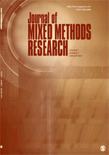
Journal of Mixed Methods Research
Advancing Knowledge Through Mixed Methods.Journal of Mixed Methods Research, published by SAGE Publications Inc, is a premier academic journal dedicated to the innovative integration of qualitative and quantitative research methodologies. Established in 2007 and continuing to influence the field until 2024, it has rapidly ascended to the top ranks of its categories, achieving a Q1 ranking in Education, Social Sciences (miscellaneous), and Statistics, Probability and Uncertainty as of 2023. With its impressive Scopus ranks—holding the 12th position out of 604 in Social Sciences and the 6th position out of 168 in Statistics—it serves as a vital resource for researchers, educators, and practitioners seeking to advance the discourse around mixed methods approaches. Although currently not an open-access journal, the Journal of Mixed Methods Research offers a platform for scholarly contributions that deepen understanding and foster interdisciplinary dialogue, making it an essential addition to the academic library for those engaged in this dynamic field.
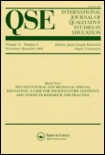
International Journal of Qualitative Studies in Education
Innovating Approaches to Qualitative Studies.Welcome to the International Journal of Qualitative Studies in Education, a prestigious publication in the field of education, managed by Routledge Journals, Taylor & Francis Ltd. With a strong emphasis on qualitative methodologies, this journal serves as a critical platform for researchers, educators, and practitioners, providing insightful analyses and innovative approaches to educational inquiry since its inception in 1988. Recognized within the Q2 category in Education as of 2023, it holds an impressive Scopus rank of 570 out of 1543, reflecting its significant impact and relevance in social sciences and education research. Although it does not offer open access, the journal's rich content contributes to the advancement of qualitative research, encouraging discourse that shapes contemporary educational practices. With a commitment to rigorous scholarly standards, the International Journal of Qualitative Studies in Education aims to stimulate critical dialogue and foster community among researchers, professionals, and students seeking to deepen their understanding of qualitative research and its applications in the rapidly evolving educational landscape.

ACTES DE LA RECHERCHE EN SCIENCES SOCIALES
Bridging Disciplines, Illuminating InsightsACTES DE LA RECHERCHE EN SCIENCES SOCIALES, published by EDITIONS SEUIL, is a distinguished journal in the field of social sciences, particularly recognized for its contributions to qualitative research and interdisciplinary dialogue. With an ISSN of 0335-5322 and an E-ISSN of 1955-2564, this journal offers an invaluable platform for the dissemination of innovative research findings and theoretical frameworks. Despite its Q4 ranking in the Social Sciences (miscellaneous) category for 2023, it serves as an essential resource for scholars seeking to explore critical social issues and methodologies. Although not an open-access journal, ACTES DE LA RECHERCHE EN SCIENCES SOCIALES makes its publications available through a rich repository that spans various topics, encouraging cross-disciplinary engagement. Researchers, professionals, and students will find this journal indispensable for staying informed about contemporary social science perspectives, as it bridges gaps in knowledge and fosters academic discourse.

Departures in Critical Qualitative Research
Fostering Innovative Dialogues in Critical MethodologiesDepartures in Critical Qualitative Research, published by University of California Press, is an influential journal dedicated to advancing knowledge within the realms of Communication and Linguistics and Language. With its commitment to exploring the complexities and nuances of qualitative research, this journal has quickly established itself as a vital resource for scholars and professionals alike. Although it currently resides in the fourth quartile in Communication and the third quartile in Linguistics, its notable Scopus rankings, including a 64th percentile in Language and Linguistics, highlight its growing significance in the academic discourse. Covering a converged period from 2019 until 2024, the journal seeks to foster innovative and critical perspectives on qualitative methodologies, offering invaluable insights that address contemporary social issues. Access to its content is available to a wide audience, contributing to the journal's reputation as a beacon for those engaged in critical qualitative research.
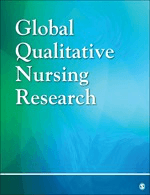
Global Qualitative Nursing Research
Advancing qualitative insights in global nursing.Global Qualitative Nursing Research, published by SAGE Publications Inc, is a premier open-access journal dedicated to advancing the field of qualitative research within nursing. Since its inception in 2014, this journal has championed the dissemination of innovative and impactful findings that enhance the understanding and practice of qualitative methodologies in nursing and healthcare contexts. With an impressive Scopus ranking of #43 out of 139 in General Nursing, placing it in the 69th percentile, and achieving a Q2 quartile ranking in 2023, it stands as a vital resource for researchers, practitioners, and students alike. The journal embraces a wide array of qualitative approaches, fostering a diverse academic dialogue that influences nursing practice, education, and policy on a global scale. As an open-access publication, it ensures that critical research is widely accessible, facilitating knowledge transfer and supporting evidence-based practices in nursing across the globe. Addressing crucial themes in nursing and qualitative research, Global Qualitative Nursing Research is positioned as an indispensable platform for the scholarly community, driving both inquiry and innovation in the nursing discipline.

AREA
Connecting Ideas for Global Impact in Spatial AnalysisAREA, with ISSN 0004-0894 and E-ISSN 1475-4762, is a premier open access journal published by Wiley since 2018, and situated in the heart of the United Kingdom. Recognized as a Q1 journal in Geography, Planning, and Development for 2023, it ranks impressively at #154 out of 821 in its category on Scopus, placing it in the 81st percentile. This esteemed journal, which has been a prominent venue for scholarly discourse since its inception in 1976, invites original research articles, reviews, and commentary that advance understanding and contribute significantly to the fields of geography and urban planning. As an open access journal, AREA ensures that high-quality research is readily available to a global audience, thus facilitating knowledge exchange and encouraging innovative approaches to geographical questions. Researchers, professionals, and students alike will find AREA to be an invaluable resource for cutting-edge insights and compelling discussions that shape the future of spatial analysis and environmental policy.
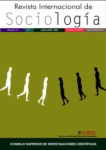
Revista Internacional de Sociologia
Bridging disciplines, fostering critical perspectives.Revista Internacional de Sociologia, published by CONSEJO SUPERIOR INVESTIGACIONES CIENTIFICAS-CSIC, stands as a pivotal scholarly journal within the field of sociology, contributing to the global discourse since its inception in 1976. With an ISSN of 0034-9712 and E-ISSN 1988-429X, this journal has proudly embraced Open Access since 2000, ensuring that its articles are readily available to researchers, professionals, and students alike, fostering the dissemination of knowledge in the social sciences. Based in Madrid, Spain, the journal continues to promote critical perspectives and interdisciplinary research, reflected in its classification as Q3 in the Social Sciences category for 2023, ranking #137 out of 275 in Scopus. Through its diverse range of published works and extensive converged years—most recently highlighted from 2008 to 2024—the Revista Internacional de Sociologia remains an essential resource for those seeking to deepen their understanding of sociological dynamics in contemporary society.
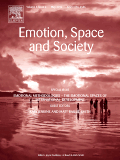
Emotion Space and Society
Fostering Critical Dialogues on Emotion in Social RealmsEmotion Space and Society, published by ELSEVIER SCI LTD, is an esteemed academic journal dedicated to advancing the fields of psychology, particularly in the domains of experimental and cognitive psychology, as well as social psychology. With an ISSN of 1755-4586 and an E-ISSN of 1878-0040, this journal has made significant contributions to understanding the complexities of emotional experiences and their impact on social dynamics since its inception in 2008. Currently holding a 2023 ranking of Q2 in both Experimental and Cognitive Psychology and Social Psychology, it is recognized for its ongoing commitment to excellence—positioning it at the 62nd percentile in Social Psychology and 59th percentile in Experimental and Cognitive Psychology according to Scopus rankings. Although unavailable as an Open Access journal, submissions to Emotion Space and Society engage a global readership, fostering critical discussions around emotional phenomena that resonate across interdisciplinary boundaries. Researchers, professionals, and students alike will find a wealth of knowledge and a platform for innovative exploration within the pages of this influential journal.
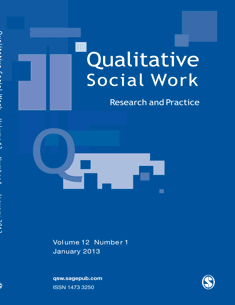
Qualitative Social Work
Unraveling Complexities in Social Work PracticeQualitative Social Work is a leading journal dedicated to advancing the field of social work through qualitative research. Published by SAGE PUBLICATIONS INC in the United States, this journal serves as a key platform for scholars and practitioners aimed at exploring the complexities of social work practice and its profound impact on individuals and communities. With an ISSN of 1473-3250 and E-ISSN 1741-3117, the journal has established a notable presence, currently ranking in the Q2 category in Health (social science) and Q1 in Social Sciences (miscellaneous) in its 2023 evaluations. The journal spans the period from 2002 to 2024, emphasizing its ongoing commitment to disseminating cutting-edge research. Although it is not an Open Access journal, its significant Scopus Ranks—ranking #100/604 in Social Sciences (miscellaneous) and #120/371 in Health (social science)—highlight the rigorous standards and relevance of its published work. Researchers, professionals, and students can benefit from the detailed insights and innovative methodologies featured within its pages, solidifying Qualitative Social Work as an essential resource for those passionate about enhancing social work practices through qualitative investigation.
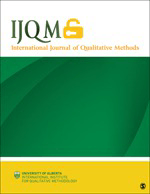
International Journal of Qualitative Methods
Advancing qualitative insights for a transformative academic landscape.International Journal of Qualitative Methods, published by SAGE Publications Inc, is a prestigious open-access journal that has been pivotal in advancing qualitative research methodologies since its inception in 2002. With its ISSN 1609-4069 and a commendable Q1 ranking in the field of Education for 2023, this journal serves as a critical platform for researchers, educators, and practitioners to publish innovative studies that enrich the qualitative research landscape. The journal is indexed in Scopus, ranking #133/1543 in the Social Sciences - Education category, placing it within the top 91st percentile of its field. International Journal of Qualitative Methods aims to foster scholarly discourse by publishing comprehensive research articles, critical essays, and insightful reviews that explore diverse qualitative research practices and their implications. As it converges from 2012 to 2024, the journal is committed to pushing boundaries and facilitating access to quality research, thereby enriching the academic community with valuable methodologies and insights.